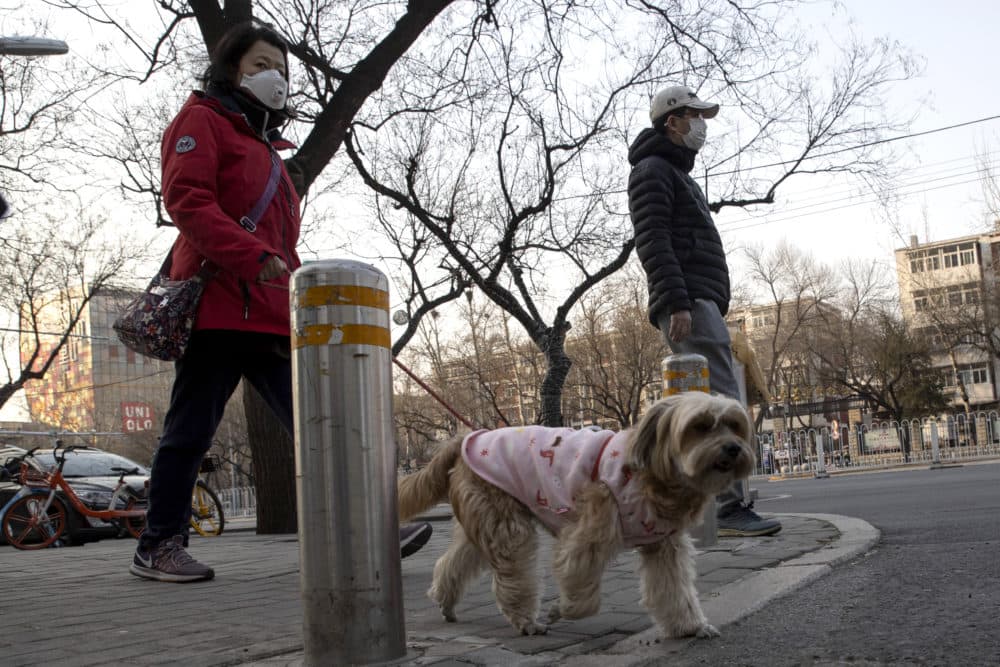Advertisement
What We Know About Pets And Coronavirus
Resume
A dog in Hong Kong tested “weak positive” for coronavirus last week.
In a likely case of human-to-animal transmission, the Hong Kong Agriculture, Fisheries and Conservation Department said experts believe the dog has “a low-level infection,” the Guardian reports.
The dog was healthy, says Scott Weese, a professor at the University of Guelph’s Ontario Veterinary College.
So is this evidence that dogs and cats can get this virus? Weese says scientists haven’t looked into animals extensively enough yet to make that conclusion.
Scientists say the virus started off in animals then moved to humans, he says. “And the big question right now is how effectively can it move back to animals or is it basically a human virus at this point?” he says.
The Centers for Disease Control and Prevention say they have not received any reports of pets becoming sick with coronavirus.
"At this time, there is no evidence that companion animals including pets can spread COVID-19," the CDC statement says. "However, since animals can spread other diseases to people, it’s always a good idea to wash your hands after being around animals."
If a person has coronavirus, Weese says not to be too worried about transmitting to animals, but rather to be aware. For example, if a person has exposed the virus to their pets, keep them quarantined as well, he suggests.
“It's treating your dog and your cat like you’ve exposed your kids,” he says.
Interview Highlights
On whether the virus can move from human to animals or vise versa
“Well, that's [scientists’] concern. Is this something that's just spreading human to human or is it almost always spreading human-human and there might be an animal source. So what we're concerned about is if someone's infected and we're trying to contain them there at home under self-isolation, but they've got a dog or a cat, and if that cat gets exposed and then takes it outside, is that a way the virus can escape some of the containment? So it's much less of an issue in animals than it is people, as far as we know. But it's a big enough problem. We want to cover all our bases.”
On what the coronavirus symptoms would be in a dog or cat
“Well, we don't really know. This dog in Hong Kong is normal. So just like in people, some people that have this virus don't have any signs of disease. So does this mean no dogs get sick or it just happened to be this dog? We don't know. If they get sick, it's probably very similar to what we would get in a respiratory disease and would usually be mild.”
On potentially transmitting coronavirus to a pet
“If someone has a coronavirus, what we want to do is keep them away from everything and everyone, and that includes animals and people. So we want them to stay away from people so that they don't affect other people, and we can keep them away from their pets and other animals at the same time. If they have already been exposed to their animals, [for example] if I've been exposed and I've been sick and I've been in the house with my dog and my cat, I've already exposed them. So the logical thing is [to] keep them inside. Keep them with me, so they don't spread it anywhere else. It's the very simple things that we can do to reduce any risk if there is some risk.”
On whether there are other viruses that move back and forth between humans and animals
“Well, there are a lot of things that we can move back and forth. That's what we call zoonotic infections –– bacteria and fungi and viruses, and some come mainly from animals to people and there are some that go person to animal. And our flu is an example of that. So the human flu, we can infect a dog. So if I have influenza and I cough on my dog or he licks my contaminated hands, there's a really low chance he'll get the flu but it's possible. We call them dead-end hosts because they get infected and they don't spread the virus anymore. So the question we have with this virus is, is this dog that's infected just a dead-end host? So we can infect animals periodically but they don’t infect someone else, or can they be infectious and pass it on like some of the things that we move back and forth and we keep moving it back and forth?”
Jill Ryan produced and edited this interview for broadcast with Kathleen McKenna. Serena McMahon adapted it for the web.
This segment aired on March 12, 2020.
